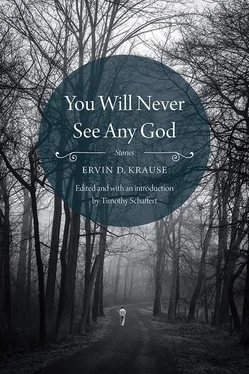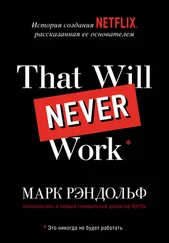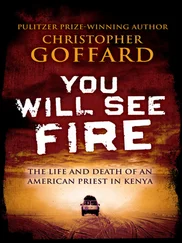He came at last to the farmstead, to the bleak, unpainted buildings in the hollow. The boy slid on his belly along the fence until he came at last to a stop in the shadow of brush that had once been a plum thicket and there he squatted and watched the yard. The house was near to him, on his left, and to his right stood the gray outbuildings, the barn and the corncrib and granary and chickenhouse. It took the boy a moment to sense where Stark was; he listened and turned his head carefully until at last he recognized the faint sounds of movement in the barn. Stark was milking. The boy squatted and clasped his hands between his knees and waited.
He had come there many times, to this spot or to places near it, and he had waited and watched. He was never impatient, and sometimes he did not see anything and at other times he saw much. He remembered especially, clearly, the time Stark brought the basket full of movement up from the hog yard. The boy saw the wet slimy head of a newborn calf over the edge of the basket as Stark carried it up, and the boy wondered why he carried the calf to the house. He saw for a moment incantations, weird magic in firelight, sacrifices of newborn calves with blood dripping endlessly from slashed, furred throats, all this and more behind the sagging screen door of Stark’s house. The light came on in the backroom where the shades were always pulled — the boy had learned quickly that Stark always went there soon after sundown and lit the lamp, making the tan, always-pulled shades glow with a weak yellow color, and then there was a light, too, in a nearer, a front room, that must have been the kitchen, but there was no other movement and no other sound, and then the lights were extinguished, first the front one and then the one in the backroom and there was nothing else at all, no light, no sound. The boy slid down the little slope until he knelt by the porch, but still he heard and saw and smelled nothing. It was as if all living creatures had vanished from around him and he was utterly alone. It terrified him and fascinated him, as seeing Stark that first day had done. He returned night after night, intent on seeing the calf; he changed his vantage point until he was certain it must still be in the house, or perhaps in Stark himself, or perhaps still bleeding as some evil sacrifice to a terrible, purplefaced, livid god. And then one day he saw the calf again, saw Stark lead it out, his hands under the calf’s belly, quite gently, across the porch, and the calf could not walk, and it tried to stand and could not and it collapsed, bellowing a strange, squeaky and broken half-wit bellow. The boy understood then; he had seen newborn calves chewed by hogs, and he knew this calf had its forefeet chewed off to nubs, and Stark had wrapped the feet, and the bandages were red with iodine and sticky with some khakicolored poultice. Stark lifted the calf and set it carefully in the grass and weeds flanking the house, folding the calf’s struggling legs so it would lie down, but the calf kept trying to stand up and would not lie down, even when Stark was there holding it. Stark tried to feed it with a bottle, but it would not take the nipple. Later on, the animal tired from its violent struggle to stand, and Stark came out in the late-evening gloom after the milking and he was able to feed it a little, but it was apparent to the boy, who had often trucked out dead pigs and chickens and even calves to the fields to rot, that the calf would die, and yet Stark tried to feed it and keep it alive. It was all like something mad, something utterly fierce and crazy, the way the gaunt, disfigured man came out and struggled with the weak, dying calf and tried to feed and nourish it. When Stark was not there on later evenings the animal tried to rise, and it fell on its side, and rose again, and it undid the bandages in its threshings and the white, hard nubs of the bones stood out like something naked and hurting and polished whitely, like ivory, and the boy thought “kill it, kill it” with a fury at the man who would want to keep such a thing alive, but still Stark tried to feed it and nourish it and he replaced the bandages and lathered them heavily with Vaseline. After two days the calf would not eat anymore and even then somehow it managed to stand, its sides transparent against the toothpick, tiny-slat ribs, and it wandered thus, falling and rising and floundering in the dust of the yard, like some mad tormented creature, driven by something inexplicable and terrible, seeking to hide in the shade of the plum brush, but always falling and being drawn in the wrong direction, wandering, mad and awful, disfigured and torn, yet somehow, madly, relentlessly living, driven like its master to live, in spite of the want for death, until at last it did die, with even the last death motion feeble, and the calf bellow only a gurgle in the quivering throat, and in the evening when the dust had cooled and Stark came back in from the fields, he took the calf and carried it up the pasture hill and buried it. The boy could see the place where he went quite clearly from where he watched.
After that the boy had even a deeper terror of and hatred for Stark. It was not because of the calf; he had no sympathy for it, for he had seen suffering, he had witnessed agony and seen the dumb struggling eyes of animals in pain, and he had grown used to it, had felt nothing at seeing death — no, that was not it — it was that Stark could want something so misshapen, so awful around, and would want to make it live. The boy wanted to destroy the calf the first time he saw it because it was so badly disfigured, just as he had calmly destroyed ducklings with misshapen beaks and pigs that were born with their guts outside themselves. That which was misshapen and marked was evil, was not natural, and needed to be destroyed, and he felt a shudder run through him, remembering how Stark wanted to keep the animal alive. There was something terrible in that effort at prolonging the life of something already wrongly there.
Stark had finished milking and he came across the yard from the barn, carrying the pail in one hand and the lantern in the other and the lantern made the shadows of his legs appear black and huge, swaying jerkily as he walked. Stark disappeared into the house, and again the light in the backroom came on first. The boy edged along the fence row behind the house until he squatted only six feet from the window with the yellow, drawn shades. There was no sound; nothing. He wondered about the light, what it could mean, why it was so important that a light burn there whenever it was dark. Perhaps, he thought, Stark was really not alone; a thousand thoughts swung through him, and he bent his head to listen but there was still no sound, no movement. He heard the locusts in the trees and the friendly crickets and then Stark turning the cream separator in the kitchen, and then the separator, too, was silent. The boy heard the door slam and he knew Stark was going out to feed the calves the skim milk. The boy stood up and moved back towards the plum thicket. It was completely dark now and he moved by ear, and it was then, as he came to the corner of the house, that he sensed someone, even as the other person, startled, sensed his presence, and the boy threw himself back as the hands reached towards him, clutching his shirt, tearing it.
“Who are you?” Stark said, his voice loud and near, and the hands tore for him, but the boy was very quick and he ducked, turning all at once, and he hit the fence and doubled over it, feeling quick pain cut him and forgetting it as he was up and running again. At the top of the hill he stopped and listened. It was dead silent. He stood, breathing hard, pausing in his breathing to listen, and tried to figure what had happened. Stark had been surprised, too, he knew, probably more surprised than he. When it was light he would come up the hill, following the tracks. The boy felt ashamed, for he had prided himself on his quickness and quietness and cleverness, too, and to be nearly caught was something to feel ashamed about. Perhaps Stark was clever too, he thought, and this made him feel better. It was a kind of contest now, a contest of wits and observation that it had not been before. He caught his breath and then doubled back, and turned and went down the hill away from both the Stark place and his own, making firm tracks, and when he reached the bottom where there were trees and grass, he walked carefully and lightly up to the road, and then crossed the road, brushing out his tracks behind him. After he crossed the road he was in their own pasture again, and he walked quickly up the hill to the house.
Читать дальше











